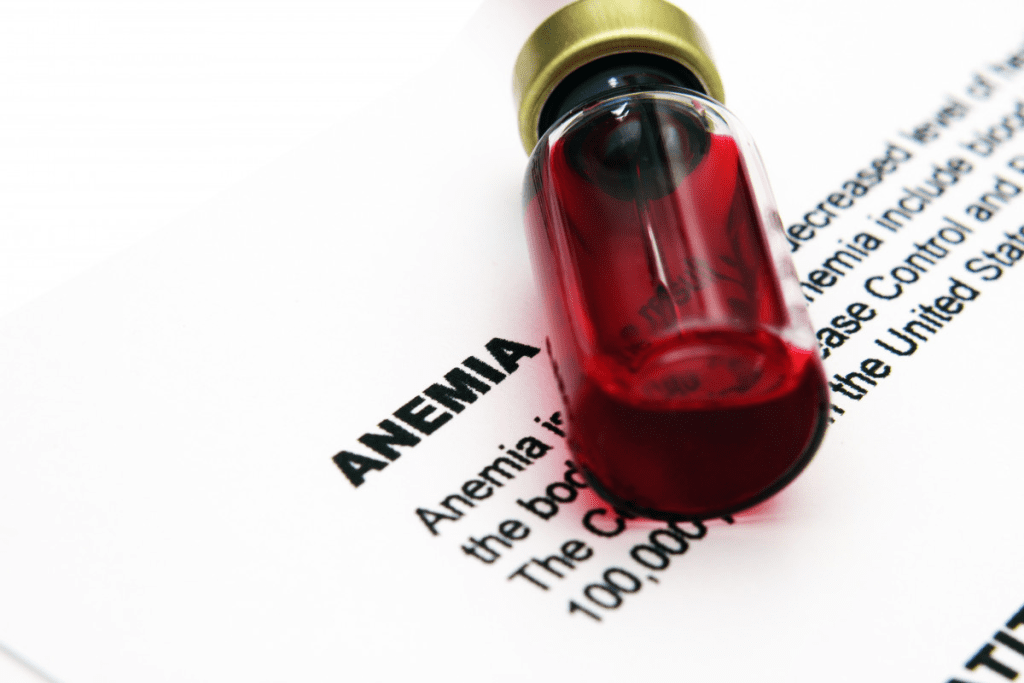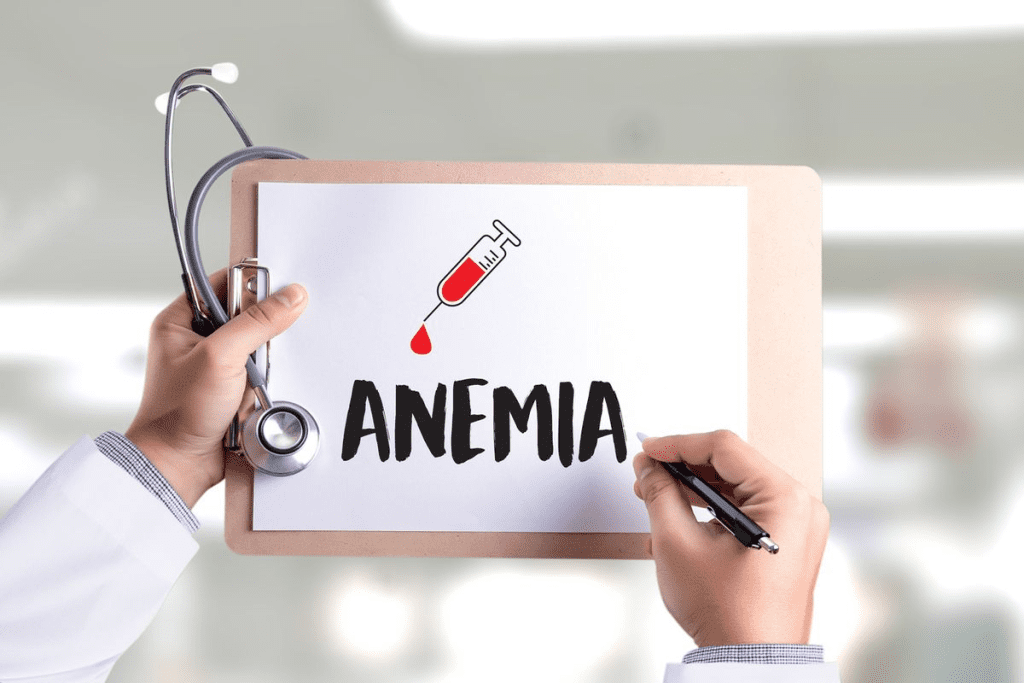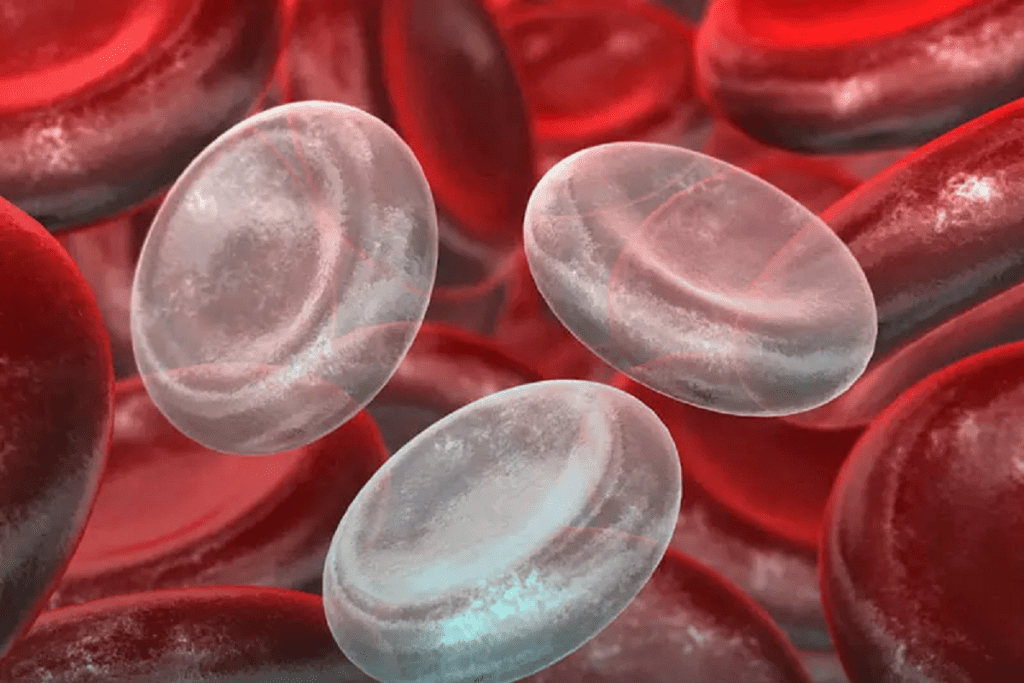
Autoimmune hemolytic anemia (AIHA) is when the immune system attacks and destroys red blood cells. This leads to anemia. Many cancers have been found to be linked to AIHA, making diagnosis and treatment harder.
We look into how different cancers can lead to AIHA. Lymphoma is closely tied to AIHA. This shows how complex the immune system and cancer can be.
Key Takeaways
- AIHA is a condition where the immune system attacks the body’s red blood cells.
- Various cancers are associated with an increased risk of AIHA.
- Lymphoma has a notable connection to AIHA.
- Understanding the link between cancer and AIHA is key for good care.
- The connection between AIHA and cancer makes patient care more complex.
Understanding Autoimmune Hemolytic Anemia (AIHA)
Autoimmune hemolytic anemia (AIHA) is a condition where the immune system attacks the body’s red blood cells. This can greatly affect a person’s life, making it important to know about it well.
Definition and Pathophysiology of Red Blood Cell Destruction
AIHA happens when the body makes antibodies against its own red blood cells. This marks them for destruction. The process can cause hemolysis, or the breakdown of red blood cells.
The breakdown of red blood cells in AIHA is due to autoantibodies and the complement system. Knowing how this works is key to finding good treatments.
Warm vs. Cold Autoimmune Hemolytic Anemia
AIHA is divided into warm and cold types based on when the autoantibodies work best. Warm AIHA happens at body temperature, while cold AIHA works best at lower temperatures.
- Warm AIHA is often linked to other autoimmune diseases or lymphoproliferative disorders.
- Cold AIHA can start with infections or certain medicines.
Primary vs. Secondary AIHA
AIHA can also be primary or secondary. Primary AIHA has no known cause, while secondary AIHA is linked to conditions like cancer or infections. Knowing if AIHA is primary or secondary helps in choosing the right treatment.
“The distinction between primary and secondary AIHA is vital. It helps in picking the right treatment and managing the underlying cause.”
Understanding AIHA well, including its types and causes, helps doctors create better treatment plans. This way, they can manage the condition more effectively.
Is Hemolytic Anemia a Form of Cancer?

To figure out if hemolytic anemia is a type of cancer, we need to look at both closely. Hemolytic anemia is when red blood cells break down too early. Cancer is when abnormal cells grow out of control and harm healthy tissues.
Distinguishing Between Blood Disorders and Malignancies
Hemolytic anemia is a blood issue, but it’s not cancer. The main difference is how cells are destroyed and why. In hemolytic anemia, red blood cells are lost due to autoimmunity, infections, or genes. Cancer, on the other hand, is about abnormal cells growing and damaging organs.
It’s key to tell these apart because their treatments and outcomes are very different. Hemolytic anemia might need steroids or drugs to stop the immune system. But cancer treatments often include surgery, chemo, or radiation.
Why These Conditions Are Often Confused
Hemolytic anemia and cancer can seem similar because they share symptoms like tiredness and shortness of breath. Some cancers can also cause hemolytic anemia, making it hard to tell them apart.
For example, some cancers like lymphomas and leukemias can lead to AIHA. This is when the immune system attacks the body’s own red blood cells. This mix-up between cancer and autoimmunity makes diagnosis tricky.
To properly diagnose and treat these issues, it’s vital to understand their causes and how they interact. This way, doctors can create treatment plans that tackle both the main problem and any side effects.
The Cancer-Autoimmune Hemolytic Anemia Connection

There’s growing interest in how cancer and AIHA are linked. It’s clear that immune issues play a big part in this connection.
Immune Dysregulation in Cancer Patients
Cancer can mess with the immune system, leading to AIHA. The immune system might start attacking red blood cells because of cancer.
Some cancers, like lymphomas, are more likely to cause AIHA. This is because of how tumor cells and the immune system interact. It can break down tolerance and lead to autoantibodies.
Paraneoplastic Autoimmune Phenomena
AIHA can happen in cancer patients due to the immune system’s reaction to the tumor. It’s not the tumor cells causing it, but how the immune system responds.
Prevalence and Risk Factors
The chance of getting AIHA with cancer varies by cancer type. Lymphoma patients, for example, are at higher risk. Other factors include the cancer’s stage and genetic mutations.
| Cancer Type | Prevalence of AIHA | Risk Factors |
| Lymphoma | High | Advanced stage, certain genetic mutations |
| Leukemia | Moderate | Specific subtypes, treatment-related factors |
| Solid Tumors | Low to Moderate | Tumor location, metastasis |
It’s key to understand the link between cancer and AIHA for better care. Knowing the risk factors and how common AIHA is in different cancers helps doctors plan better treatment and diagnosis.
Lymphoma and Autoimmune Hemolytic Anemia: A Strong Association
It’s important to understand how lymphoma and AIHA are connected. Lymphomas are a group of blood cancers. They are linked to autoimmune diseases like AIHA.
AIHA happens when the body attacks its own red blood cells. This leads to their early destruction. The link between lymphoma and AIHA is complex. It involves problems with the immune system and autoantibodies.
Non-Hodgkin Lymphoma Subtypes and AIHA Risk
Non-Hodgkin lymphoma (NHL) includes many types of blood cancers. Some NHL types are more likely to cause AIHA. Diffuse large B-cell lymphoma and chronic lymphocytic leukemia/small lymphocytic lymphoma are examples.
The reasons for this link are not fully understood. It involves problems with the immune system and autoantibodies.
Hodgkin Lymphoma-Associated Hemolytic Anemia
Hodgkin lymphoma is also linked to AIHA, but less often. AIHA in Hodgkin lymphoma patients can make treatment harder. It may also affect their chances of recovery.
Management Strategies for Lymphoma-AIHA Patients
Dealing with lymphoma and AIHA together needs a detailed plan. This plan must tackle both the cancer and the autoimmune issue. It often includes treatments for the cancer, reducing the autoimmune response, and managing anemia.
First, treatments for AIHA in lymphoma patients might include steroids and immunosuppressants. Sometimes, treatments for the lymphoma, like chemotherapy or rituximab, can also help with AIHA.
Chronic Lymphocytic Leukemia (CLL) and AIHA
It’s important to understand how CLL and AIHA are connected. CLL is a blood cancer that makes too many immature white blood cells. AIHA happens when the immune system attacks red blood cells, marking them for destruction.
Mechanisms of Autoimmunity in CLL
AIHA in CLL patients comes from how CLL cells affect the immune system. CLL cells can mess up the immune system, causing it to attack red blood cells.
Key mechanisms include:
- Impaired immune tolerance
- Altered cytokine production
- Direct interaction between CLL cells and immune cells
Predictive Factors for AIHA Development in CLL
Finding out who might get AIHA in CLL is key. Studies have shown some signs that can predict this risk.
| Predictive Factor | Description |
| Advanced CLL stage | Patients with advanced CLL are at higher risk of developing AIHA. |
| Specific genetic mutations | Certain genetic mutations in CLL cells may predispose to AIHA. |
| Immunoglobulin gene rearrangements | Abnormal immunoglobulin gene rearrangements can contribute to autoimmunity. |
Treatment Challenges and Approaches
Treating AIHA in CLL is tough. We need to tackle both CLL and AIHA at the same time.
Doctors use corticosteroids, immunosuppressive therapy, and targeted treatments. These aim to lower CLL cell numbers and ease AIHA symptoms.
Can Anemia Turn Into Leukemia? Understanding the Relationship
Anemia and leukemia are different, but they’re connected. Anemia means not enough healthy red blood cells, making you tired and weak. Leukemia is a cancer that affects the blood and bone marrow.
Clarifying Common Misconceptions
Many think anemia can turn into leukemia. But, anemia is not a precursor to leukemia. It’s not a direct cancer transformation. Instead, anemia can be a sign of many health issues, including leukemia.
Anemia has many causes, like iron or vitamin deficiencies, chronic diseases, or bone marrow problems. Leukemia, being a bone marrow disorder, can cause anemia by messing with blood cell production.
When Anemia and Leukemia Co-occur
Anemia and leukemia can happen together, making diagnosis and treatment harder. Leukemia can stop the bone marrow from making red blood cells, leading to anemia. Anemia in leukemia patients often means a more serious disease or worse outlook.
| Condition | Characteristics | Relationship with Anemia |
| Anemia | Lack of healthy red blood cells | Can be caused by various factors, including leukemia |
| Leukemia | Cancer of the blood and bone marrow | Can lead to anemia by disrupting blood cell production |
Warning Signs That Require Medical Attention
Knowing the warning signs for leukemia is key. Look out for:
- Persistent fatigue and weakness
- Unexplained weight loss
- Fever or chills
- Frequent infections
- Bleeding or bruising easily
If you have anemia symptoms or have been diagnosed, talk to your doctor. They can find the cause and plan the right treatment.
Other Hematologic Malignancies Associated with AIHA
We look into how AIHA is linked to different blood cancers, like multiple myeloma and acute leukemias. While lymphomas and Chronic Lymphocytic Leukemia (CLL) are known causes of AIHA, other blood cancers also play a role.
Multiple Myeloma and Hemolytic Complications
Multiple myeloma is a cancer of plasma cells in the bone marrow. It can cause hemolytic anemia. The exact reasons are not clear, but it’s thought that immune problems and abnormal proteins might destroy red blood cells.
A study in the Journal of Clinical Oncology found that hemolytic anemia can be the first sign of multiple myeloma. This shows why a full check-up is important.
| Hematologic Malignancy | Association with AIHA | Mechanism |
| Multiple Myeloma | Yes | Immune dysregulation, abnormal protein production |
| Acute Leukemias | Yes | Immune system dysregulation, paraneoplastic phenomena |
| Myelodysplastic Syndromes | Yes | Abnormal bone marrow function, ineffective erythropoiesis |
Acute Leukemias and Autoimmune Phenomena
Acute leukemias, like ALL and AML, can cause autoimmune issues, including AIHA. The fast growth of cancer cells can mess up the immune system.
“Autoimmune hemolytic anemia is a recognized complication of acute leukemias, requiring prompt diagnosis and management to prevent severe anemia and its consequences.”
Myelodysplastic Syndromes
Myelodysplastic syndromes (MDS) are disorders with poorly formed blood cells. They are mainly linked to anemia and other blood problems. But, MDS can also cause AIHA because of the bad bone marrow and poor red blood cell production.
It’s key to know how these blood cancers and AIHA are connected. Spotting AIHA early and treating it well can greatly help patients with blood cancers.
Solid Tumors That Can Trigger Autoimmune Hemolytic Anemia
Solid tumors in the ovaries, breast, and gastrointestinal tract can lead to AIHA. The exact reasons are not fully known. But research has shown how these cancers and AIHA are connected.
Ovarian and Gynecological Cancers
Ovarian cancer and other gynecological cancers are linked to AIHA. This happens because of immune system problems and autoantibodies. A study found ovarian cancer patients are more likely to get AIHA.
Key Findings:
- Ovarian cancer patients are at an increased risk of AIHA.
- Immune system dysregulation plays a key role.
- Autoantibody production is a big factor.
Breast Cancer-Associated Autoimmunity
Breast cancer is also linked to AIHA. The connection between breast cancer and autoimmunity is complex. Some breast cancer treatments might also cause AIHA.
“The association between breast cancer and AIHA highlights the need for clinicians to be aware of this possible complication in patients with malignancies.”
Gastrointestinal and Other Solid Malignancies
Gastrointestinal cancers, like gastric and colorectal cancers, are also linked to AIHA. These cancers might cause immune system problems and autoantibodies. Other cancers, like lung and kidney cancers, can also lead to AIHA, but less often.
| Cancer Type | Association with AIHA | Mechanism |
| Ovarian Cancer | Strong | Immune Dysregulation |
| Breast Cancer | Moderate | Autoantibody Production |
| Gastrointestinal Cancer | Moderate | Paraneoplastic Phenomena |
In conclusion, many solid tumors can cause AIHA. This shows why doctors need to watch for AIHA in patients with these cancers.
Diagnosing AIHA in Cancer Patients: Challenges and Approaches
Diagnosing AIHA in cancer patients is tough. It needs a deep understanding of both conditions. Cancer and its treatment can make it harder to spot AIHA, so a careful approach is key.
Key Laboratory Tests and Findings
Several key tests are used to diagnose AIHA. The Direct Antiglobulin Test (DAT) is vital. It shows if antibodies or proteins are stuck to red blood cells. Other tests include:
- Complete Blood Count (CBC) to check anemia levels.
- Reticulocyte Count to see how the bone marrow is doing.
- Lactate Dehydrogenase (LDH) levels to measure hemolysis.
These tests help figure out how much hemolysis is happening and guide further steps.
Distinguishing Cancer-Related from Treatment-Related AIHA
Telling cancer-related AIHA from treatment-related AIHA is important. Cancer-related AIHA might be linked to the cancer itself, like lymphoproliferative disorders. Treatment-related AIHA can happen as a side effect of some therapies, like chemotherapy or immunotherapy. Knowing the patient’s medical history and when AIHA started can help.
Diagnostic Algorithm and Workup
A clear diagnostic plan is needed for cancer patients with AIHA. The steps include:
- Initial Assessment: First, check the patient’s symptoms and run lab tests to see if there’s hemolytic anemia.
- DAT and Other Specific Tests: Next, do tests like DAT to confirm AIHA.
- Evaluation of Underlying Cancer: Then, check how the cancer is doing.
- Review of Cancer Treatment: Look at when AIHA started in relation to cancer treatment.
By using this method, doctors can accurately diagnose AIHA in cancer patients. This helps them create the right treatment plan.
Treatment Strategies for Cancer-Associated AIHA
Managing cancer-associated Autoimmune Hemolytic Anemia (AIHA) needs a detailed plan. It must tackle the cancer and the autoimmune disorder together. This approach is key to managing both conditions effectively.
Addressing the Underlying Malignancy
It’s vital to treat the cancer first in cancer-associated AIHA. This can help ease AIHA symptoms. Cancer treatment modalities like chemotherapy, targeted therapy, or immunotherapy are used based on the cancer type and stage.
- Chemotherapy can lessen the number of cancer cells, helping with AIHA.
- Targeted therapies aim at specific cancer and AIHA causes.
- Immunotherapy can adjust the immune system, possibly reducing autoimmunity.
First-Line AIHA Treatments
First treatments for AIHA often include corticosteroids, like prednisone. They aim to lessen the immune system’s attack on red blood cells. This helps reduce hemolysis and improves anemia.
- High doses are used first to quickly control hemolysis.
- Then, the dose is slowly reduced to avoid long-term side effects.
In some cases, intravenous immunoglobulin (IVIG) is used. It helps temporarily stop red blood cell destruction by antibodies.
Second-Line and Refractory Disease Management
For those not responding to first treatments or who relapse, second-line therapies are considered. These include:
- Rituximab, a monoclonal antibody that targets B cells, can reduce autoantibodies.
- Immunosuppressive drugs like cyclophosphamide or azathioprine are used in tough cases.
- Splenectomy, or removing the spleen, may be an option in some cases to lower red blood cell destruction.
Novel and Targeted Therapeutic Approaches
New treatments for AIHA are being researched. Promising areas include:
- Complement inhibitors, which target the complement system involved in hemolysis.
- Bruton tyrosine kinase (BTK) inhibitors, which can control B cell activation and antibody production.
These new treatments offer hope for better managing cancer-associated AIHA. They could provide more effective and targeted options for patients.
Cancer Treatments That Can Cause Hemolytic Anemia
Certain cancer treatments can lead to hemolytic anemia. It’s important to understand these risks for better patient care.
Chemotherapy-Induced Hemolytic Reactions
Chemotherapy is a key part of cancer treatment. But, it can cause hemolytic anemia in some patients. The reasons are complex, involving damage to red blood cells and immune reactions.
Key factors contributing to chemotherapy-induced hemolytic anemia include:
- Direct damage to red blood cell membranes
- Immune system dysregulation
- Drug-specific effects, varying across different chemotherapy agents
For example, drugs like fludarabine and cladribine increase the risk of hemolytic complications.
Immunotherapy and Checkpoint Inhibitor Complications
Immunotherapy, like checkpoint inhibitors, boosts the immune system against cancer. But, it can also cause autoimmune reactions, including hemolytic anemia.
Notable aspects of immunotherapy-related hemolytic anemia:
- It’s a rare but serious side effect
- Can happen with different checkpoint inhibitors, such as nivolumab and pembrolizumab
- Needs quick recognition and treatment to avoid severe problems
Monitoring and Prevention Strategies
Regular checks for hemolytic anemia are vital. This includes:
- Regular blood counts to check for anemia and hemolysis
- Direct Coombs test to find immune-mediated hemolysis
- Lactate dehydrogenase (LDH) levels to see red blood cell destruction
To prevent hemolytic anemia, choose treatments wisely. Sometimes, safer alternatives are considered.
“The key to managing treatment-induced hemolytic anemia lies in early detection and a multidisciplinary approach to patient care.”
Expert Opinion
Living with Autoimmune Hemolytic Anemia and Cancer
Understanding AIHA and cancer is key when you have both. Patients face special challenges that affect their life and treatment. It’s important to know how these conditions work together.
Managing Daily Life and Symptoms
Living with AIHA and cancer means dealing with many symptoms. Fatigue is a big one for both conditions. It’s hard to deal with. Working with your doctor to make a plan is a good idea.
Here are some tips for daily life:
- Make rest a priority and keep a regular sleep schedule.
- Try gentle exercises like yoga or short walks to fight fatigue.
- Use stress-reduction methods like meditation or deep breathing.
Nutritional Considerations and Supportive Care
Eating right is very important for AIHA and cancer patients. The right foods can help with symptoms and keep you healthy. Focus on:
| Nutritional Element | Benefit |
| Iron-rich foods | Helps manage anemia |
| Antioxidant-rich foods | Supports overall health and reduces oxidative stress |
| Adequate hydration | Essential for maintaining healthy blood cells |
Patient Support Resources and Communities
Connecting with others who understand can be very helpful. It offers emotional support and practical tips. Look into:
- Online forums and support groups for AIHA and cancer patients.
- Local cancer support organizations and events.
- Mental health professionals who focus on chronic illness and cancer care.
Using these resources and being proactive can make a big difference. It helps patients with AIHA and cancer live better and handle their treatments better.
Conclusion
Understanding the link between autoimmune hemolytic anemia (AIHA) and cancer is key. This knowledge helps in giving the best care to those with these conditions. We’ve looked at how AIHA and cancer are connected, including the reasons behind it, how to diagnose it, and how to treat it.
AIHA and cancer have a complex relationship. Some cancers, like lymphoma and chronic lymphocytic leukemia, often go hand in hand with AIHA. Treating AIHA in cancer patients needs a careful plan. This plan must consider the cancer and how treatments might affect AIHA.
Healthcare teams can improve patient care by understanding the AIHA and cancer link. A team effort is vital for patients with both conditions. This ensures they get the support they need to manage their health.
FAQ
What is autoimmune hemolytic anemia (AIHA)?
AIHA is when the immune system attacks and destroys red blood cells. This leads to anemia.
Is hemolytic anemia a form of cancer?
No, it’s not cancer. But it can happen with some cancers, like lymphoma and leukemia.
What cancers are associated with AIHA?
Cancers like lymphoma, CLL, multiple myeloma, and some solid tumors are linked to AIHA.
Can anemia turn into leukemia?
Anemia itself doesn’t turn into leukemia. But, anemia can be a sign or a risk factor for leukemia in some cases.
How is AIHA diagnosed in cancer patients?
Doctors use tests like the direct antiglobulin test and complete blood count to diagnose AIHA in cancer patients. They also check if the AIHA is related to the cancer or treatment.
What are the treatment strategies for cancer-associated AIHA?
Treatment for AIHA linked to cancer includes treating the cancer first. Then, doctors use corticosteroids and other targeted treatments for the AIHA.
Can cancer treatments cause hemolytic anemia?
Yes, treatments like chemotherapy and immunotherapy can cause hemolytic anemia. It’s important to monitor and prevent this complication.
How can patients manage daily life with AIHA and cancer?
Patients can manage by focusing on nutrition and getting supportive care. They also find help in patient support groups and communities.
What is the relationship between lymphoma and AIHA?
Lymphoma and AIHA are closely linked. Some lymphoma types are more likely to cause AIHA. It’s important to manage both conditions well.
Are there any specific challenges in treating AIHA in CLL patients?
Treating AIHA in CLL patients is challenging. It’s because CLL and AIHA interact in complex ways. Doctors need to carefully choose treatments and consider several factors.
References
How Autoimmune Hemolytic Anemia and Blood Cancers Are Connected. (2023). MyAIHA Team.
https://www.myaihateam.com/resources/how-autoimmune-hemolytic-anemia-and-blood-cancers-are-connected























